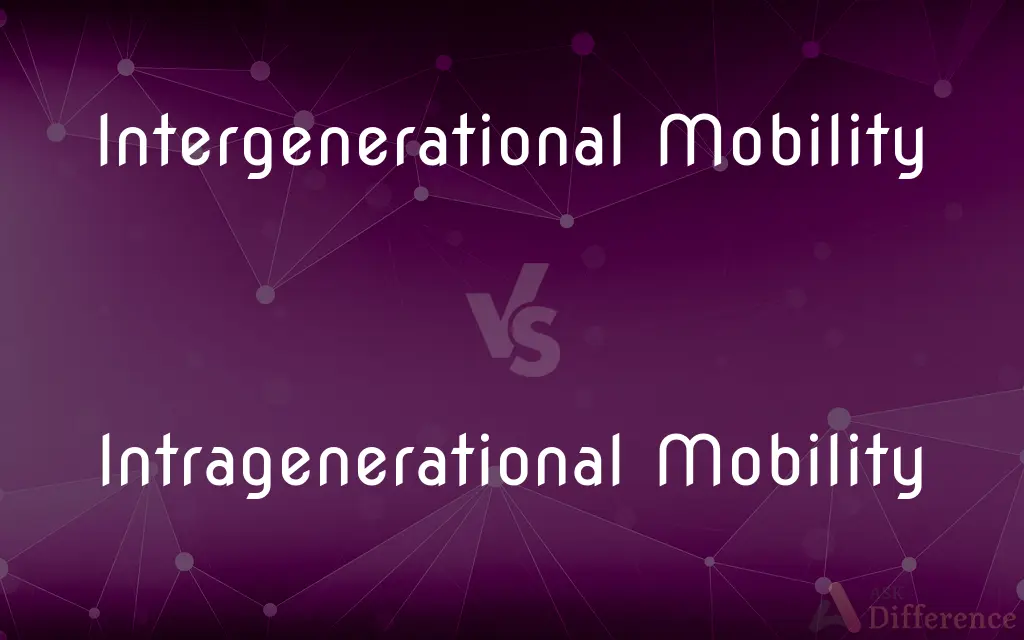Intergenerational Mobility vs. Intragenerational Mobility — What's the Difference?
Edited by Tayyaba Rehman — By Fiza Rafique — Published on December 8, 2023
Intergenerational Mobility refers to changes in social or economic status between different generations; Intragenerational Mobility concerns such changes within one's own lifetime.

Difference Between Intergenerational Mobility and Intragenerational Mobility
Table of Contents
ADVERTISEMENT
Key Differences
Intergenerational Mobility pertains to the socioeconomic shifts witnessed between distinct generations within a family. This concept zeroes in on the changes in social or economic standing from parents to their offspring. On the flip side, Intragenerational Mobility encapsulates the fluctuations in socioeconomic status that an individual might experience throughout their personal life. It does not consider the generational gaps but focuses on one person's journey.
Discussing economic perspectives, Intergenerational Mobility seeks to understand if children fare better, the same, or worse than their parents in terms of income or social rank. Societies with high Intergenerational Mobility typically suggest a more equitable distribution of opportunities. In contrast, Intragenerational Mobility contemplates how an individual's earnings or status might alter from early adulthood to middle age and later years, emphasizing personal career and life trajectories.
From a societal viewpoint, Intergenerational Mobility provides insights into the effectiveness of equal opportunity policies, examining if each successive generation progresses or not. In contrast, Intragenerational Mobility offers a snapshot of how flexible and adaptable a society is, indicating how easily individuals can climb or descend the social ladder in their lifetime.
In terms of timeframe, Intergenerational Mobility has a more extended lens, spanning multiple decades as it compares separate generations. It might take years to discern tangible shifts in this form of mobility. Conversely, Intragenerational Mobility can manifest in shorter durations, reflecting the ups and downs in an individual's career or social standing.
Elucidating on personal relevance, while Intergenerational Mobility compares individuals to their familial predecessors or successors, Intragenerational Mobility holds direct implications for individuals, charting their socioeconomic journey and the factors influencing it.
ADVERTISEMENT
Comparison Chart
Time Span
Between different generations
Within an individual's lifetime
Reference Point
Compares to parents or offspring
Compares to an individual's earlier or later life stages
Insight Provided
Equal opportunities across generations
Societal flexibility and adaptability
Typical Research Focus
Children's socioeconomic status relative to their parents'
Changes in individual's status from youth to old age
Relevance
Assesses generational progress
Directly pertains to an individual's socioeconomic journey
Compare with Definitions
Intergenerational Mobility
Evaluation of generational progress or regression.
Economic policies can significantly impact a country's Intergenerational Mobility.
Intragenerational Mobility
Alterations in wealth or position within one generation.
Career choices play a pivotal role in Intragenerational Mobility.
Intergenerational Mobility
Changes in wealth or position over distinct family generations.
Many immigrants hope for improved Intergenerational Mobility for their children.
Intragenerational Mobility
Socioeconomic changes within a person's lifetime.
John's shift from a clerk to a CEO showcases high Intragenerational Mobility.
Intergenerational Mobility
Socioeconomic shifts between generations.
Higher education has increased Intergenerational Mobility for many families.
Intragenerational Mobility
Tracking individual socioeconomic trajectories.
Many aim to improve their Intragenerational Mobility through continued education.
Intergenerational Mobility
Movement in social or economic status from parents to children.
Intergenerational Mobility is often used to gauge a society's equal opportunity policies.
Intragenerational Mobility
Movement in status during an individual's life.
Economic downturns can negatively impact one's Intragenerational Mobility.
Intergenerational Mobility
The comparison of separate generations' economic standings.
Studies show varying degrees of Intergenerational Mobility across countries.
Intragenerational Mobility
Assessment of personal progress or regression.
Entrepreneurial ventures can offer opportunities for significant Intragenerational Mobility.
Common Curiosities
How does Intragenerational Mobility differ from Intergenerational Mobility?
Intragenerational Mobility refers to socioeconomic changes within an individual's lifetime, while Intergenerational Mobility pertains to changes between generations.
Can an individual experience both types of mobility?
Yes, an individual can be part of Intergenerational Mobility when comparing to parents and also undergo Intragenerational Mobility in their life.
What does Intergenerational Mobility primarily study?
Intergenerational Mobility primarily studies socioeconomic changes between different generations.
Which type of mobility offers insights into equal opportunities across generations?
Intergenerational Mobility provides insights into equal opportunities across generations.
Is Intergenerational Mobility static across countries?
No, Intergenerational Mobility varies across countries based on economic, social, and policy differences.
Can a person's career choice determine their Intragenerational Mobility?
Yes, career choices can have a significant impact on one's Intragenerational Mobility.
Which mobility type directly pertains to an individual's socioeconomic journey?
Intragenerational Mobility directly pertains to an individual's socioeconomic journey.
How do economic policies impact Intergenerational Mobility?
Economic policies, especially those focused on equal opportunities, can either promote or hinder Intergenerational Mobility.
Does higher education impact Intergenerational Mobility?
Yes, higher education can positively influence Intergenerational Mobility by providing better opportunities.
Can societal structures influence Intergenerational Mobility?
Yes, societal structures, including economic systems and social norms, can influence Intergenerational Mobility.
Can societal events, like recessions, affect Intragenerational Mobility?
Absolutely, recessions and other societal events can significantly impact Intragenerational Mobility.
Are there any barriers to Intragenerational Mobility?
Barriers like discrimination, economic downturns, and lack of access to education can hinder Intragenerational Mobility.
What factors might influence an individual's Intragenerational Mobility?
Career choices, education, economic conditions, and personal decisions can impact Intragenerational Mobility.
Does age play a role in Intragenerational Mobility?
Yes, age can influence Intragenerational Mobility as individuals progress through different life and career stages.
What role does education play in Intergenerational Mobility?
Education can be a major driver of Intergenerational Mobility, offering better opportunities for the next generation.
Share Your Discovery

Previous Comparison
Substitutional Alloys vs. Interstitial Alloys
Next Comparison
Endocrine Glands vs. Exocrine GlandsAuthor Spotlight
Written by
Fiza RafiqueFiza Rafique is a skilled content writer at AskDifference.com, where she meticulously refines and enhances written pieces. Drawing from her vast editorial expertise, Fiza ensures clarity, accuracy, and precision in every article. Passionate about language, she continually seeks to elevate the quality of content for readers worldwide.
Edited by
Tayyaba RehmanTayyaba Rehman is a distinguished writer, currently serving as a primary contributor to askdifference.com. As a researcher in semantics and etymology, Tayyaba's passion for the complexity of languages and their distinctions has found a perfect home on the platform. Tayyaba delves into the intricacies of language, distinguishing between commonly confused words and phrases, thereby providing clarity for readers worldwide.














































